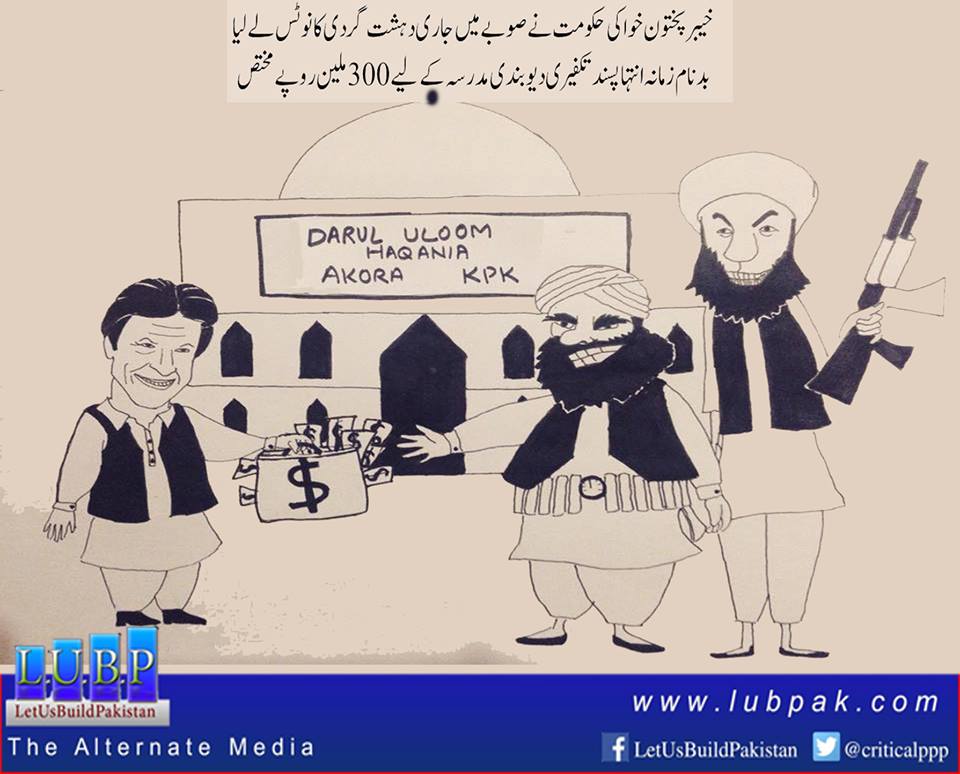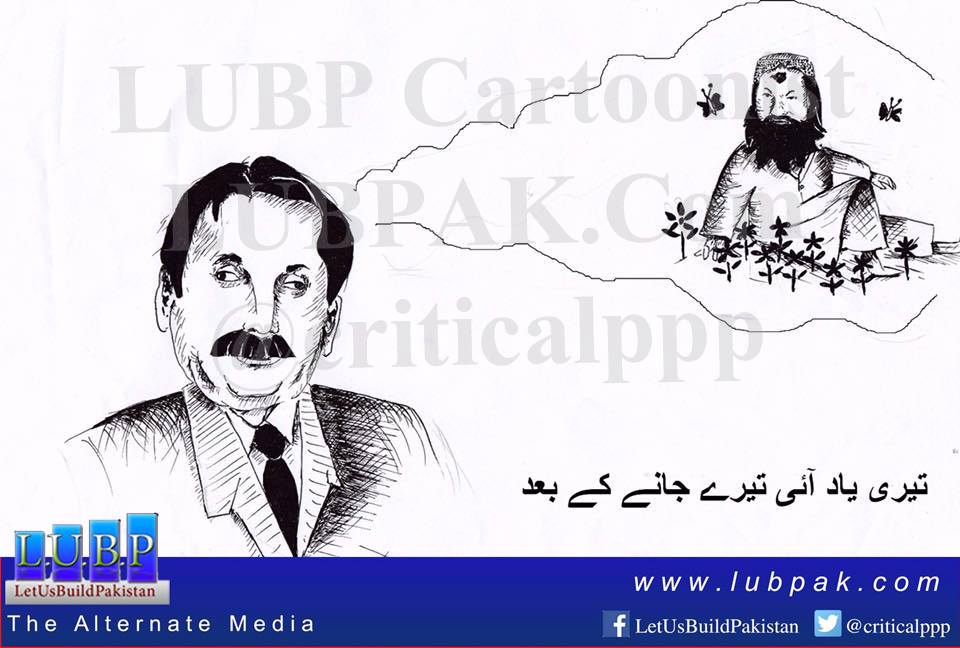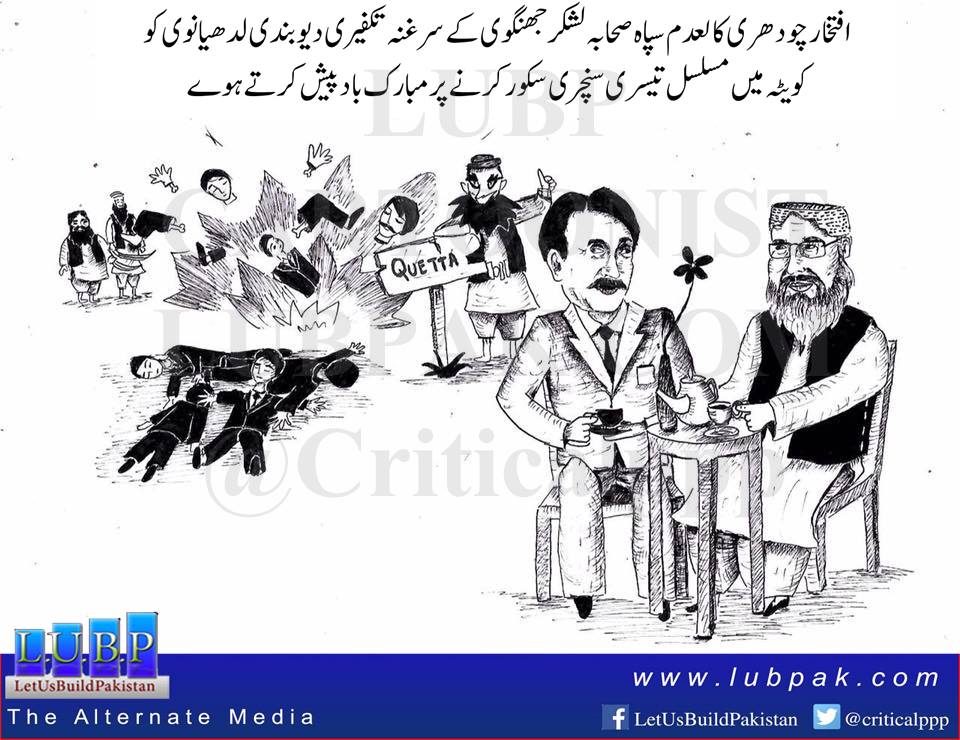Partying with Takfiri Deobndis



Editor’s note: While OBJ blames Zardari for rehabilitating the Lal Masjid and its cleric, he has deliberately overlooked the role of the then Chief Justice of Pakistan, Justice Iftikhar Chaudhry and other pro-Taliban elements in the Establishment! During the 2013 general elections, Taliban did not allow any “secular” political party (PPP, ANP, MQM, etc.) to run election campaign; and just before that Taliban had assassinated Benazir Bhutto. During this whole power play of Taliban the security apparatus of Pakistan stayed “neutral” as if they had nothing to do with Taliban or as if Taliban were also legitimately free to manipulate election campaigns. OBJ also did not talk about the role of PMLN or other religio-political parties which benefited from Taliban’s interventionist policies on all crucial occasions in the history of Pakistan. Moreover, OBJ has been running a campaign against MQM to undermine it politically on some baseless charges. He tried to help PTI’s Imran in his anti-MQM tirade, but in fact OBJ benefited the Taliban in Karachi.
FOR many years now, the Pakistani military has been criticised for supporting violent Deobandi groups. And liberals can be forgiven for having strong feelings on the subject. During the 1990s, when the Kashmir insurgency was in full swing, the liberals repeatedly predicted a backlash. The number of people killed by jihadists since then — including many in the army — shows that the liberals’ warnings were well founded.
But the military has not been alone in indulging the men of violence. Civilian leaders too have cut deals with Deobandis who, if circumstances permitted, would like to see those politicians not only out of power but dead and buried too. And this is not a point that favours one party over the others: all the mainstream parties have made compromises with the extremists.
The most obvious recent example concerns the decision of the Khyber Pakhtunkhwa provincial administration to grant $3 million to Samiul Haq’s Haqqani madressah. Lest anyone be in any doubt about where Samiul Haq stands on matters of contemporary politics, his recently published book claims that the Afghan Taliban provided good government; that Osama bin Laden was an “ideal man” and that Al Qaeda was a figment of the Western imagination.
Perhaps more importantly, some of those who assassinated Benazir Bhutto met in his madressah whilst planning the attack. And Imran Khan has form in this area. When, in 2013, he agreed to head up the Pakistan Taliban’s negotiating team he demonstrated not only that he thought peace could be achieved through dialogue but also that he was willing to represent and speak for the TTP.
But it is not fair to single out the PTI leader. After all, in 2010 the Punjab provincial administration gave $1m to institutions linked to Jamaatud Dawa. In the same year, files recovered from Osama bin Laden’s compound in Abbottabad reportedly revealed that as Punjab chief minister Shahbaz Sharif suggested the Pakistan government was ready to re-establish “normal relations” with the Pakistani Taliban as long as it did not conduct operations in Punjab. And there have been compromises within Punjab as well. In the run-up to the 2013 election there were widespread reports of a seat adjustment deal between the PML-N and ASWJ. Faced with criticism about these arrangements, some PML-N spokesmen did not issue a denial but argued instead that PPP exhibited a blatant double standard on the issue because it had done much the same thing in 2008.
Certainly, the PPP has on occasion helped hardliners. Given what happened in Islamabad in 2007, it is astonishing that, today, Abdul Aziz Ghazi is not only back in charge of the Lal Masjid but also drawing a state salary. As a recent independent documentary, Among the Believers, has recorded, it is not as if Abdul Aziz Ghazi has changed his view on the need to overthrow the government and impose Sharia: “if you think you can change us, forget it,” he said.
And yet while Asif Zardari was president the authorities not only oversaw the rehabilitation of Abdul Aziz Ghazi but went as far as offering him land for a new madressah on the edge of Islamabad. The idea, it seems, was that Lal Masjid needed to be compensated for the destruction it had brought upon itself.
These examples of civilian willingness to do business with violent jihadis suggest that they should not be taken too seriously when they criticise the army for doing much the same thing. Yet there is an important difference between the two. Ever since 1947-48, when the state connived in allowing Pakhtun tribesmen to go on jihad in Kashmir, the military has perceived the jihadis as a strategic asset that can help achieve various policy objectives. And some objectives have been achieved. The successful Mujahideen campaign against the Soviets in Afghanistan demonstrated that the violent Deobandis can serve a purpose.
The politicians have different motives. Some are simply trying to protect themselves. After all, anyone extending favours to the Deobandi leadership must calculate that there will be an improved chance that they won’t be the victim of an attack. But it’s not just a case of avoiding physical harm. There is also the grubby business of political advantage. Politicians on all sides have calculated that if securing power depends on reaching a deal with the religious hardliners then it’s a price well worth paying.
For millions of Pakistanis who are not at the top of the various power structures, it might seem obvious enough that people who use violence to secure their objectives should be opposed. But most of those who have held power in Pakistan seem to have seen it differently. And while the military is often criticized for sponsoring Deobandis , it’s only fair to point out that the politicians have themselves repeatedly appeased them.
Source:
http://www.dawn.com/news/1279699/partying-with-jihadis
